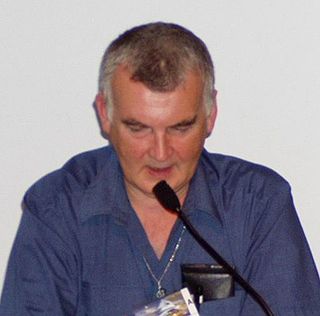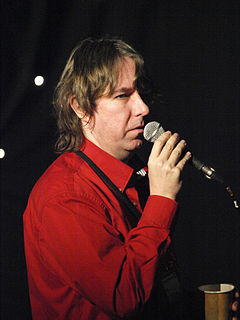
Kenneth Macrae MacLeod is a Scottish science fiction writer. His novels The Sky Road and The Night Sessions won the BSFA Award. MacLeod's novels have been nominated for the Arthur C. Clarke, Hugo, Nebula, Locus, and Campbell Memorial awards for best novel on multiple occasions. A techno-utopianist, MacLeod's work makes frequent use of libertarian socialist themes; he is a three-time winner of the libertarian Prometheus Award. Prior to becoming a novelist, MacLeod studied biology and worked as a computer programmer. He sits on the advisory board of the Edinburgh Science Festival.
Known Space is the fictional setting of about a dozen science fiction novels and several collections of short stories written by Larry Niven. It has also become a shared universe in the spin-off Man-Kzin Wars anthologies. The Internet Speculative Fiction Database (ISFDB) catalogs all works set in the fictional universe that includes Known Space under the series name Tales of Known Space, which was the title of a 1975 collection of Niven's short stories. The first-published work in the series, which was Niven's first published piece was "The Coldest Place", in the December 1964 issue of If magazine, edited by Frederik Pohl. This was the first-published work in the 1975 collection.

Do Androids Dream of Electric Sheep? is a dystopian science fiction novel by American writer Philip K. Dick, first published in 1968. The novel is set in a post-apocalyptic San Francisco, where Earth's life has been greatly damaged by a nuclear global war, leaving most animal species endangered or extinct. The main plot follows Rick Deckard, a bounty hunter who is tasked with "retiring" six escaped Nexus-6 model androids, while a secondary plot follows John Isidore, a man of sub-par IQ who aids the fugitive androids.

Posthumanism or post-humanism is a term with at least seven definitions according to philosopher Francesca Ferrando:
- Antihumanism: any theory that is critical of traditional humanism and traditional ideas about humanity and the human condition.
- Cultural posthumanism: a branch of cultural theory critical of the foundational assumptions of humanism and its legacy that examines and questions the historical notions of "human" and "human nature", often challenging typical notions of human subjectivity and embodiment and strives to move beyond archaic concepts of "human nature" to develop ones which constantly adapt to contemporary technoscientific knowledge.
- Philosophical posthumanism: a philosophical direction that draws on cultural posthumanism, the philosophical strand examines the ethical implications of expanding the circle of moral concern and extending subjectivities beyond the human species.
- Posthuman condition: the deconstruction of the human condition by critical theorists.
- Posthuman transhumanism: a transhuman ideology and movement which seeks to develop and make available technologies that eliminate aging, enable immortality and greatly enhance human intellectual, physical, and psychological capacities, in order to achieve a "posthuman future".
- AI takeover: A variant of transhumanism in which humans will not be enhanced, but rather eventually replaced by artificial intelligences. Some philosophers, including Nick Land, promote the view that humans should embrace and accept their eventual demise. This is related to the view of "cosmism", which supports the building of strong artificial intelligence even if it may entail the end of humanity, as in their view it "would be a cosmic tragedy if humanity freezes evolution at the puny human level".
- Voluntary Human Extinction, which seeks a "posthuman future" that in this case is a future without humans.

Transhumanism is a philosophical and intellectual movement which advocates for the enhancement of the human condition by developing and making widely available sophisticated technologies that can greatly enhance longevity and cognition. It also predicts the inevitability of such technologies in the future.

Stephen Baxter is an English hard science fiction author. He has degrees in mathematics and engineering.

Alastair Preston Reynolds is a British science fiction author. He specialises in hard science fiction and space opera. He spent his early years in Cornwall, moved back to Wales before going to Newcastle University, where he read physics and astronomy. Afterwards, he earned a PhD in astrophysics from the University of St Andrews. In 1991, he moved to Noordwijk in the Netherlands where he met his wife Josette. There, he worked for the European Space Research and Technology Centre until 2004 when he left to pursue writing full-time. He returned to Wales in 2008 and lives near Cardiff.
The Heechee Saga, also known as the Gateway series, is a series of science fiction novels and short stories by Frederik Pohl. The Heechee are an advanced alien race that visited the Solar System hundreds of millennia ago and then mysteriously disappeared. They left behind bases containing artifacts, including working starships, which are discovered and exploited by humanity.

Joe William Haldeman is an American science fiction author. He is best known for his novel The Forever War (1974). That novel and other works, including The Hemingway Hoax (1991) and Forever Peace (1997), have won science fiction awards, including the Hugo Award and Nebula Award. He was awarded the SFWA Grand Master for career achievements. In 2012 he was inducted as a member of the Science Fiction Hall of Fame. Many of Haldeman's works, including his debut novel War Year and his second novel The Forever War, were inspired by his experiences in the Vietnam War. Wounded in combat, he struggled to adjust to civilian life after returning home. From 1983 to 2014, he was a professor teaching writing at the Massachusetts Institute of Technology (MIT).

The Hyperion Cantos is a series of science fiction novels by Dan Simmons. The title was originally used for the collection of the first pair of books in the series, Hyperion and The Fall of Hyperion, and later came to refer to the overall storyline, including Endymion, The Rise of Endymion, and a number of short stories. More narrowly, inside the fictional storyline, after the first volume, the Hyperion Cantos is an epic poem written by the character Martin Silenus covering in verse form the events of the first two books.

The Forever War (1974) is a military science fiction novel by American author Joe Haldeman, telling the contemplative story about human soldiers fighting an interstellar war against an alien civilization known as the Taurans. It won the Nebula Award in 1975 and the Hugo and Locus awards in 1976. Forever Free (1999) and Forever Peace (1997) are respectively, direct and thematic sequel novels. The novella A Separate War (1999) is another sequel of sorts, occurring simultaneously with the final portion of The Forever War. Informally, the novels comprise The Forever War series; the novel also inspired a comic book and a board game. The Forever War is the first title in the SF Masterworks series.

The Time Ships is a 1995 hard science fiction novel by Stephen Baxter. A canonical sequel to the 1895 novella The Time Machine by H. G. Wells, it was officially authorized by the Wells estate to mark the centenary of the original's publication. The Time Ships won critical acclaim. It won the John W. Campbell Memorial Award and the Philip K. Dick Award in 1996, as well as the British Science Fiction Association Award in 1995. It was also nominated for the Hugo, Clarke and Locus Awards in 1996.

A Deepness in the Sky is a science fiction novel by American writer Vernor Vinge. Published in 1999, the novel is a loose prequel to his earlier novel A Fire Upon the Deep (1992). The title is coined by one of the story's main characters in a debate, in a reference to the hibernating habits of his species and to the vastness of space.

Schismatrix is a science fiction novel by Bruce Sterling, originally published in 1985. The story was Sterling's only novel-length treatment of the Shaper/Mechanist universe. Five short stories preceded the novel and are published together with it in a 1996 edition entitled Schismatrix Plus. Schismatrix was nominated for the Nebula Award for Best Novel in 1985, and the British Science Fiction Award in 1986.

Peter Watts is a Canadian science fiction author. He specializes in hard science fiction. He earned a Ph.D from the University of British Columbia in Vancouver, British Columbia in 1991, from the Department of Zoology and Resource Ecology. He went on to hold several academic research and teaching positions, and worked as a marine-mammal biologist. He began publishing fiction around the time he finished graduate school.
Destiny's Children is a science-fiction series by Stephen Baxter. It takes place within his larger series, the Xeelee Sequence. Like his previous Manifold Trilogy, the books are not direct sequels to one another, but are instead thematically linked by the appearance of concepts, themes, and sometimes characters in multiple books. Examples of this include:
The Xeelee Sequence is a series of hard science fiction space opera novels, novellas, and short stories written by British science fiction author Stephen Baxter. The series spans billions of years of fictional history, centering on humanity's future expansion into the universe, its intergalactic war with an enigmatic and supremely powerful Kardashev Type IV alien civilization called the Xeelee, and the Xeelee's own cosmos-spanning war with dark matter entities called Photino Birds. The series features many other species and civilizations that play a prominent role, including the Squeem, the Qax, and the Silver Ghosts. Several stories in the Sequence also deal with humans and posthumans living in extreme conditions, such as at the heart of a neutron star (Flux), in a separate universe with considerably stronger gravity (Raft), and within eusocial hive societies (Coalescent).

Glasshouse is a science fiction novel by British author Charles Stross, first published in 2006. The novel is set in the twenty-seventh century aboard a spacecraft adrift in interstellar space. Robin, the protagonist, has recently had his memory erased. He agrees to take part in an experiment, during which he is placed inside a model of a late twentieth/early twenty-first century Euroamerican society. Robin is given a new identity and body, specifically that of a woman named "Reeve". Major themes of this novel are identity, gender determinism, self-image and conformity. Contrary to popular belief, it is not a sequel to his 2005 novel Accelerando, although Stross has stated that the two novels are not obviously incompatible. Glasshouse won the Prometheus Award for 2007, and was nominated for the Hugo, Campbell, and Locus Awards in 2007.
The Revelation Space universe is a fictional universe which was created by Alastair Reynolds and used as the setting for a number of his novels and stories. Its fictional history follows the human species through various conflicts from the relatively near future to approximately 40,000 AD. It takes its name from Revelation Space (2000), which was the first published novel set in the universe.
La saga de los Aznar is a work of 32 science fiction novels by Spanish writer Pascual Enguídanos. They were published in Spain between 1953 and 1958 and 1973 and 1978 in the Luchadores del Espacio collection by Editorial Valenciana and they appeared under the pseudonym George H. White. It received the European SF Award for Best Cycle of Novels at the Eurocon in Brussels in 1978.














